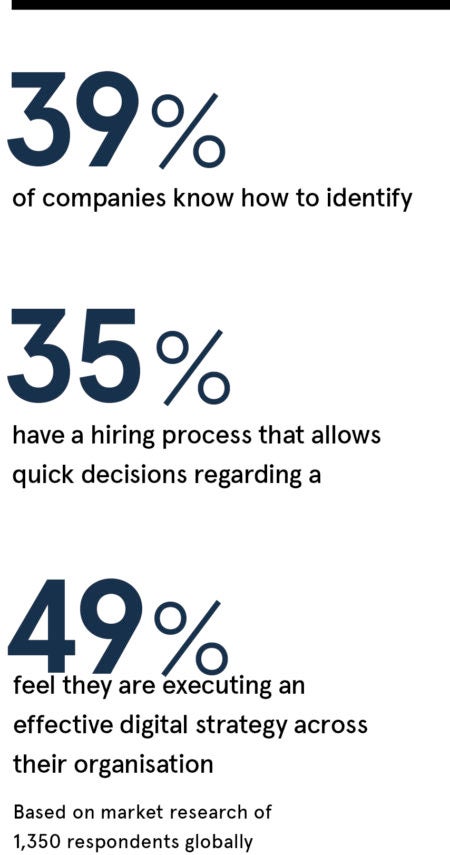Digital technology has transformed the work environment. The rise of automation and the fourth industrial revolution are changing the jobs landscape at an unprecedented pace, creating uncertainty in organisations and among the people they employ. 
According to Deloitte, nearly half of today’s jobs will be gone in the next ten years. They won’t necessarily disappear, however, so much as evolve. This new world of work needs people who can easily adapt in ever-transient environments, with behaviours that ensure they are effective and engaged no matter how much technology and jobs change.
Human resources professionals are expected to navigate organisations through this new and evolving environment, putting processes in place to support their business strategies. They need to identify, develop and transition people into the right roles, assess talent for future skills and empower employees to evolve alongside changing jobs and requirements.
But even organisations with high digital readiness face difficulties identifying the right talent. In a global study of 1,400 leaders by Aon’s Assessment Solutions, only one in four respondents who rated their company’s digital transformation highly also thought it had critical competencies in place to future-proof their workforce. Just 11 per cent said their hiring processes incorporate assessments for digital competencies and a mere 7 per cent said their organisation knows how to identify individuals with digital potential.
“There are some underlying behaviours that companies can identify when searching for those who will thrive in the digital world,” says Andreas Lohff, chief executive of Aon’s Assessment Solutions. “A lot of it circles around adaptability. Can you stay employable and adjust to new challenges and tasks? How open are you to new experiences? How curious are you about what is possible? How many ideas can you contribute yourself? And can you reinvent your old area of responsibility in terms of a digital experience?
“Mindset is also important because we know people can get very comfortable, but they need to be able to leave their comfort zone. And self-organisation is crucial because the only way you can get a company up to speed is by delegating tasks further down the line and empowering people to organise themselves in the way they treat tasks and projects. That means more focus on project management skills, teamwork and the ability to take responsibility for your own decisions rather than pushing decision-making up a line.”
A digital working environment requires teams to work virtually and globally. Teams working across functions are needed to connect the dots, bring knowledge together, innovate and quickly react to changes in the environment. Flexible structures support cross-functional collaboration and allow set-up of teams based on occurring challenges.
Data is central to creating a future-proof talent strategy. HR professionals should look at organisations that are further ahead and benchmark against them. Due to its work in human capital solutions, Aon is in the unique position of being able to provide data on jobs and organisation structures, but also on individuals. Its digital readiness model focuses on the core competencies of learnability, agility and curiosity, all three of which show significant correlations with their respective performance factors.
“We can measure the behaviours, skills, interests, motives and intellectual capacity of people on various levels, not just managerial, but also project managers, shop-floor workers, and even down to people like drivers and machine operators,” says Mr Lohff. “We have a broad range of measurement instruments that can provide a digital profile.
“Aon’s Assessment Solutions can help organisations understand their challenges, but also help individuals to understand their own talents and how they will fit into a future set of tasks and jobs. We help organisations to measure and select the right people, but at the same time provide a lot of self-assessment to individuals who can then carve out their own opportunities and understand the skills and qualities they’ll need to achieve their career aspirations.”
For more information please visit assessment.aon.com/digital-readiness






